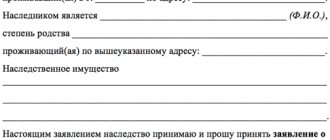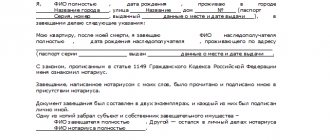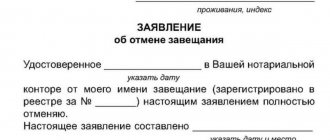When is the will promulgated?
The announcement of orders left by the owner of the property is carried out by a notary in two cases: if the testator’s copy is lost or if the deceased has drawn up a closed document. The closed type of document implies complete confidentiality of the instructions left until the day of death of the testator.
The announcement procedure is carried out for relatives, specified recipients after the death of the testator. During the lifetime of the owner, the “secrecy of the will” applies.
According to the basic requirements for drafting, the paper is drawn up in two copies, one of which is kept by the owner, the second by the notary. You can find out the location of the notary who prepared the document at any notary office. It is enough to provide a package of documents and write an application to search for paper. The applicant will be issued a certificate indicating the address of the specialist who certified the document. Information about the preparation of a document is recorded through a unified notary register.
Documents compiled before the beginning of 2021 may not be recorded in the electronic system.
There are several principles that should not be violated by the text of the order: the interests of applicants for the allocation of a mandatory share must be taken into account, the order must fit within the framework of the law.
Errors in drafting may be grounds for challenging the order in court.
When is a will promulgated after death?
A closed order is announced only after the death of the testator. Until that moment, the secrecy of the will applies (Article 1123 of the Civil Code of the Russian Federation). The notary, witnesses, executor of the will or other persons have no right to disclose information about the existence or content of the order.
The basis for opening a sealed envelope is the death certificate of an individual . An application for acceptance of an inheritance can be submitted by any relative, mainly a close circle. Immediately after receiving the documents, the notary sets a date for the reading of the will. At the same time, the notary sends out a notice to potential heirs about the date and time of the proclamation of the will. The failure of applicants to appear does not prevent the performance of a notarial act.
Example:
The heirs became aware of Sokolov’s death - this happened on August 11, 2021. The testator's relatives lived in another city, so they were not able to arrive at the deceased's address immediately. The heirs contacted the registry office, received Sokolov’s death certificate, and notified the notary on August 20, 2021. It turned out that the deceased left a closed will - the notary set the date for opening the envelope for August 23, 2021. The countdown of the 6-month period for accepting Sokolov’s inheritance will begin not from August 23, but from August 11, 2021 - this is exactly the date indicated on the death certificate.
The procedure for probating a will
The announcement of a testamentary disposition takes place in the presence of heirs and witnesses after the death of the testator. The day of opening of the inheritance is considered the moment of death of the owner. To register property through a notary, six months are allocated from the date of opening of the inheritance.
In some cases, the court recognizes the death of the testator. In such cases, the opening date is considered to be the day the court decision comes into force.
The death of the testator can be reported by relatives, heirs appointed by the will, or the executor. A notary office specialist can contact applicants thanks to the coordinates left by the compiler. The information left during preparation may not be relevant at the time of opening of the inheritance. If the applicant has not expressed his desire to exercise inheritance rights within six months, the property may be subject to division between other applicants.
The notary has no right to disclose the contents of the document until the death of the testator. “Secrecy” is protected by law. This rule is of particular importance when opening closed documents.
Concealing the existence of a documentary order of the owner regarding the property may cause the applicant to be recognized as an unworthy heir.
We recommend reading: Is it necessary to enter into an inheritance if there is a deed of gift?
Procedure for proclamation of a will
It is believed that a will must be opened on the day of death or on the day the court decision entering into legal force establishing the fact of the death of the testator. But it must be taken into account that the notary does not receive information about the death of the testator from sources other than the documents submitted by the heirs.
The proclamation of a testamentary disposition takes place in the presence of a notary - or the one who directly certified the document. Or any other notary whom the heirs contacted, if the original will is in their hands.
After the notary verifies the legality and validity of the document, he performs the following actions:
- Forms a circle of heirs under the will;
- Establishes a mandatory share that the heirs receive regardless of the content of the testamentary disposition.
- Distributes inherited property among heirs;
- Issues a certificate of inheritance to the heirs.
About where to go and what to do in the article “Opening an inheritance case with a notary.”
Announcement of a closed will
A closed will differs from an ordinary - open - not only in the order of execution, but also in the order of announcement. A closed will is handed over to the notary by the testator personally in a sealed envelope in the presence of witnesses - who put confirming signatures on the envelope - and is stored in the notary's office. Heirs do not have the right to open a closed will on their own. The notary announces it after the heirs submit an application and submit the necessary documents confirming the death of the testator (see “Procedure for receiving inheritance under a will”).
For a closed will, the deadline for its publication is set - no later than 15 days from the date of receipt of documents from the heirs.
The opening of the envelope with a closed will occurs in accordance with the procedure established by paragraph 4 of Article 1126 of the Civil Code of the Russian Federation.
Sequencing:
- Obtaining from the heirs identification documents confirming the death of the testator.
- Establishment of family ties between the heirs and the testator.
- Setting a time for opening the envelope and explaining to the heirs the procedure for the upcoming procedure.
- Notifying relatives and heirs by law about the date and time of opening of a closed will - by sending notifications to their place of residence or publishing an announcement in the media.
- On the appointed day, opening the envelope with a closed will is mandatory in the presence of the heirs (or their representatives by law or power of attorney) and two witnesses .
Expert opinion
Semyon Frolov
Lawyer. 7 years of experience. Specialization: family, inheritance, housing law.
First, the notary reads the information from the first envelope: information about the testator (full name, place of residence), date and place of acceptance of the closed will, information about the witnesses who were present at that moment (full name, place of residence) . Then the first envelope is unsealed - carefully so as not to damage the notes on it. Those present are shown an inner envelope with a notary inscription and signatures of witnesses who were present during the notarization procedure. Then the second, inner envelope with the testamentary document is printed - carefully to preserve the notes and signatures on the envelope and not to damage the document inside the envelope.
- Reading out the will of the testator - demonstrating the document to those present.
- If necessary, an explanation of the contents of the testamentary disposition.
- Drawing up a protocol of the procedure carried out in the form prescribed by the Ministry of Justice of the Russian Federation, reading the protocol out loud to everyone present, signing the document by a notary and two witnesses (if witnesses refuse to sign the protocol, a corresponding mark is placed in the document), entering information into the register.
- Issuance of notarized copies of the will and protocol to the heirs. The original will and envelopes remain in the custody of the notary.
Sample protocol on opening of a will
Price
The publication of a will is a paid service of a notary. The heirs bear the costs of legal actions.
Opening the envelope and reading out the last will of the deceased testator by a notary will cost 300 rubles (clause 14, clause 1, article 333.24 of the Tax Code of the Russian Federation). Even if there are children, parents and spouses among relatives, the tariff is the same for everyone. At the same time, the heirs will have to pay for legal and technical services ( UPTH ). Prices vary and are set in each region. Maximum tariffs can be tracked on the website of the Notary Chamber of the Russian Federation. Typically, notaries charge from 1,000 to 4,000 rubles for work.
You can learn about other expenses from the article “How much does it cost to inherit?”
Thus, the last will of the testator regarding the disposal of his property is announced to relatives and other interested parties in a manner strictly regulated by law. Violation of the established procedure may become grounds for challenging the will.
Conclusions:
- The will is announced only after the death of the testator.
- The heirs can contact any notary and find out where the will is located.
- A closed will is kept in a sealed envelope - only a notary can open it and read out the text of the letter.
- Heirs and witnesses must be present when the will of the deceased is announced.
- The notary draws up a protocol that the envelope has been opened and the will has been read to the heirs.
- The deadline for proclamation of a closed will is no later than 15 days after the opening of the inheritance case.
- The cost of paying for the notary's actions is 300 rubles.
Inheritance is a legally complex procedure with many pitfalls.
Inheritance under a will is no exception. And if, as a rule, no problems arise with the reading of the will, difficulties await further. For example, if the will indicates unworthy heirs or it is necessary to take into account the obligatory share. Not all issues are resolved peacefully. Often you have to defend your interests in court. If you have questions about a regular or closed will, you do not agree with the notary, or you are worried about your share in the inheritance, contact a lawyer. Free consultations will help you understand what to do next and where to go? Many issues can be resolved at the pre-trial stage, but for this you need to draw up an algorithm of actions. Lawyers will advise you on the main points and help you understand the documents. Attention!
- Due to frequent changes in legislation, information sometimes becomes outdated faster than we can update it on the website.
- All cases are very individual and depend on many factors. Basic information does not guarantee a solution to your specific problems.
That's why FREE expert consultants work for you around the clock!
- via the form (below), or via online chat
- Call the hotline:
- Moscow and the Region
- St. Petersburg and region
- FREE for a lawyer!
By submitting data you agree to the Consent to PD Processing, PD Processing Policy and User Agreement.
Anonymously
Information about you will not be disclosed
Fast
Fill out the form and a lawyer will contact you within 5 minutes
Tell your friends
Rate ( 3 ratings, average: 4.00 out of 5)
Author of the article
Irina Garmash
Family law consultant.
Author's rating
Articles written
612
Opening and reading of the will
The notary's office specialist must announce the procedure for dividing the bequeathed property. A notary opens a closed type of will according to a certain protocol. The notary must open the envelope with the closed will and reveal the secret of the last will of the deceased within two weeks after the death of the testator. During this time, a specialist from the notary’s office informs applicants about the appointed date for the announcement of the deceased’s order.
The opening and announcement procedure takes place on a strictly designated day. The procedure is as follows:
- The announcement takes place in front of all applicants;
- The notary reads the text of the order.
The envelope with the closed type of will is opened in front of all applicants. Before the paper reading procedure begins, passports are checked. The document remains in the custody of the notary.
OPENING THE ENVELOPE WITH THE WILL
Upon presentation of the death certificate of the person who made a closed will, the notary, no later than fifteen calendar days, opens the envelope with the will in the presence of at least two witnesses and interested persons from among the legal heirs who wish to be present. After opening the envelope and reading out the text of the document contained in it, the notary draws up and signs, together with the witnesses, a protocol certifying the opening of the envelope with the will and containing the full text of this will. The requirements for the content of the protocol must be strictly observed by the notary, since according to clause 4 of Article 1126 of the Civil Code of the Russian Federation, the original will is kept by the notary, and the heirs are given a notarized copy of the protocol.
CONCLUSION
In conclusion, we can conclude in accordance with Article 1126 of the Civil Code of the Russian Federation that the testator has the right to make a will without giving other persons, including a notary, the opportunity to familiarize themselves with its contents. This will mean a closed will.
This law came into force recently. Inheritance law was introduced by law on March 1, 2002. Previously, the testator was not given such an opportunity.
There are different requirements for writing such a will than for a regular will: it cannot be typed on a typewriter or computer. A closed will must be personally written and signed by the testator. Failure to comply with these rules entails the invalidity of the will.
This is interesting: Can a brother challenge a will 2021
The closed will in a sealed envelope is handed over by the testator to the notary in the presence of two witnesses who sign the envelope. The envelope signed by the witnesses is sealed in their presence by a notary in another envelope, on which the notary makes an inscription containing information about the testator from whom the closed will was accepted by the notary, the place and date of its acceptance, surname, first name, patronymic and place of residence of each witness in accordance with the identity document.
When accepting an envelope with a closed will from the testator, the notary is obliged to explain to the testator the rules for writing a closed will and the content of Article 1149 of the Civil Code (on the obligatory share in the inheritance) and make an appropriate inscription about this on the second envelope, as well as issue the testator a document confirming the acceptance of the closed will.
Upon presentation of the death certificate of the person who made a closed will, the notary, no later than 15 days from the date of presentation of the certificate, opens the envelope with the will in the presence of at least two witnesses and interested persons from among the legal heirs who wish to be present.
After opening the envelope, the text of the will contained in it is immediately read out by the notary, after which the notary draws up and, together with the witnesses, signs a protocol certifying the opening of the envelope with the will and containing the full text of the will.
The original will is kept by the notary. The heirs are given a notarized copy of the protocol.
Opening and reading of a closed will
After the death of the owner, applicants must arrive at the notary's office on the appointed day. A specialist must read a closed will after checking the seals and signatures on the envelope, indicating the authenticity of the paper. The notary reads out the last will of the deceased according to a similar scheme.
When the text of the will is read out, a protocol is created. The protocol describes the terms of the order, the data of the applicants present, the notary's data, the amount of the state fee, the date of announcement, signatures, and seals.
A closed will can be made public only at the request of interested parties.
How to enter into an inheritance under a closed will?
Entering into an inheritance under a closed will has no specific differences.
After the death of a citizen, within six months, the heirs must contact a notary office to open an inheritance case. Entry into inheritance is regulated by Art. 1153 of the Civil Code of the Russian Federation. 6 months after the death of a citizen, a notary issues a certificate confirming the right to inheritance.
Citizens have the right to enter into an inheritance or refuse it in favor of others. To do this, a statement is written to the notary in charge of the inheritance case.
What to do after the will is announced
After the will is announced, interested parties can agree with the text of the document, prepare documents for entering into inheritance rights, and write statements of desire to exercise the right to receive a share.
Relatives may disagree with the contents of the document. Draw up a statement of claim to the court, attach a documentary substantiation of the reason to cancel the testator’s order.
The applicant has the right to refuse the allocated share, write a written refusal or ignore the inheritance procedure.
What is probate of a will?
The announcement of the posthumous orders of the testator is a procedure carried out by a notary, the purpose of which is to reveal the secrets of the will to the successors and relatives of the deceased. First of all, this is necessary in the case when the act of last will was made by the testator in a closed form, but to one degree or another it is also applied to other types of wills, for example, when the contents of the document are not reliably known to the heirs, and the testator’s copy is lost.
The announcement is made at the request of the heirs or close relatives of the testator only after his death. Previously, it is prohibited to report the essence and even the existence of a will to a notary and other persons knowledgeable about it.









